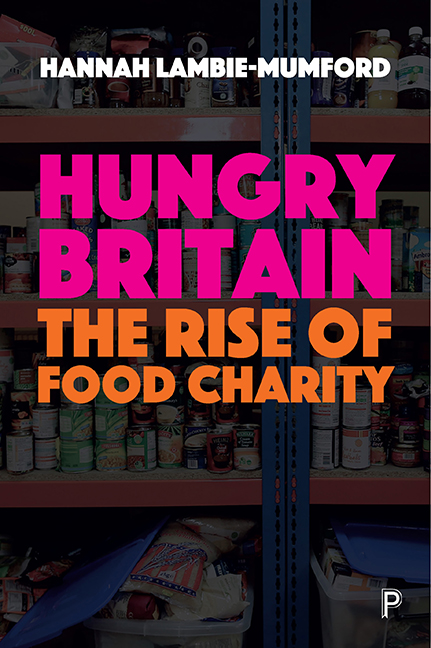Book contents
- Frontmatter
- Dedication
- Contents
- List of figures
- List of abbreviations
- Acknowledgements
- Foreword
- One Introduction
- Two Hunger and charitable emergency food provision in the UK and beyond
- Three Theories of the food insecurity ‘problem’ and the right to food ‘solution’
- Four Food charity: the ‘other’ food system
- Five The sustainability of food charity
- Six Food charity as caring
- Seven Food charity and the changing welfare state
- Eight Conclusion
- References
- Index
Five - The sustainability of food charity
Published online by Cambridge University Press: 05 April 2022
- Frontmatter
- Dedication
- Contents
- List of figures
- List of abbreviations
- Acknowledgements
- Foreword
- One Introduction
- Two Hunger and charitable emergency food provision in the UK and beyond
- Three Theories of the food insecurity ‘problem’ and the right to food ‘solution’
- Four Food charity: the ‘other’ food system
- Five The sustainability of food charity
- Six Food charity as caring
- Seven Food charity and the changing welfare state
- Eight Conclusion
- References
- Index
Summary
Sustainability, by right to food standards, requires adequate amounts of food to be accessible in the short, medium and longer term. As a practical response to the problem of food insecurity, this means that, in emergency food systems, both the ability of emergency providers to make enough food available in the immediate and longer terms, and the ability of recipients to access this food through these organisations now and into the future, are important points of analysis. To explore whether this is true of the systems emerging in the UK, this chapter explores questions of availability and accessibility through an analytical framework of power.
For the purposes of this chapter, power is seen as the ‘capacity for exercising agency’ (Elder-Vass, 2010, p.87). For questions of sustainability (as the availability and accessibility of emergency food), the agency of emergency food providers to secure a food supply and the agency of people in need to access it are particularly important points for empirical exploration. Given the importance of structure embedded within the conceptualisations and definitions of food insecurity and the right to food adopted for the book, agency (as power) is also understood here to occur within the context of structures that shape it. In particular, this chapter explores the agency of emergency food providers to make food available within the structures of the food system on the one hand, and the agency of people to access that food within the structures of emergency food provision on the other. In arriving at conclusions from the findings presented, the work of Poppendieck (1998) on the ‘seven deadly “ins”’ of emergency food – notably, instability and inaccessibility – is drawn on.
In exploring the agency of emergency food providers to make food available, this chapter focuses on the relationship between these organisations and the wider food system by exploring their agency in relation to two key aspects of this dynamic: in sourcing food; and in corporate partnerships and future planning. The direct sourcing of food is clearly imperative for emergency food organisations to make food available now and into the future, but – as will become apparent in this chapter – corporate partnerships with food retailers and others are also important aspects of how these organisations are able to operate now, and are shaping the way they will operate into the future.
- Type
- Chapter
- Information
- Hungry BritainThe Rise of Food Charity, pp. 75 - 94Publisher: Bristol University PressPrint publication year: 2017



